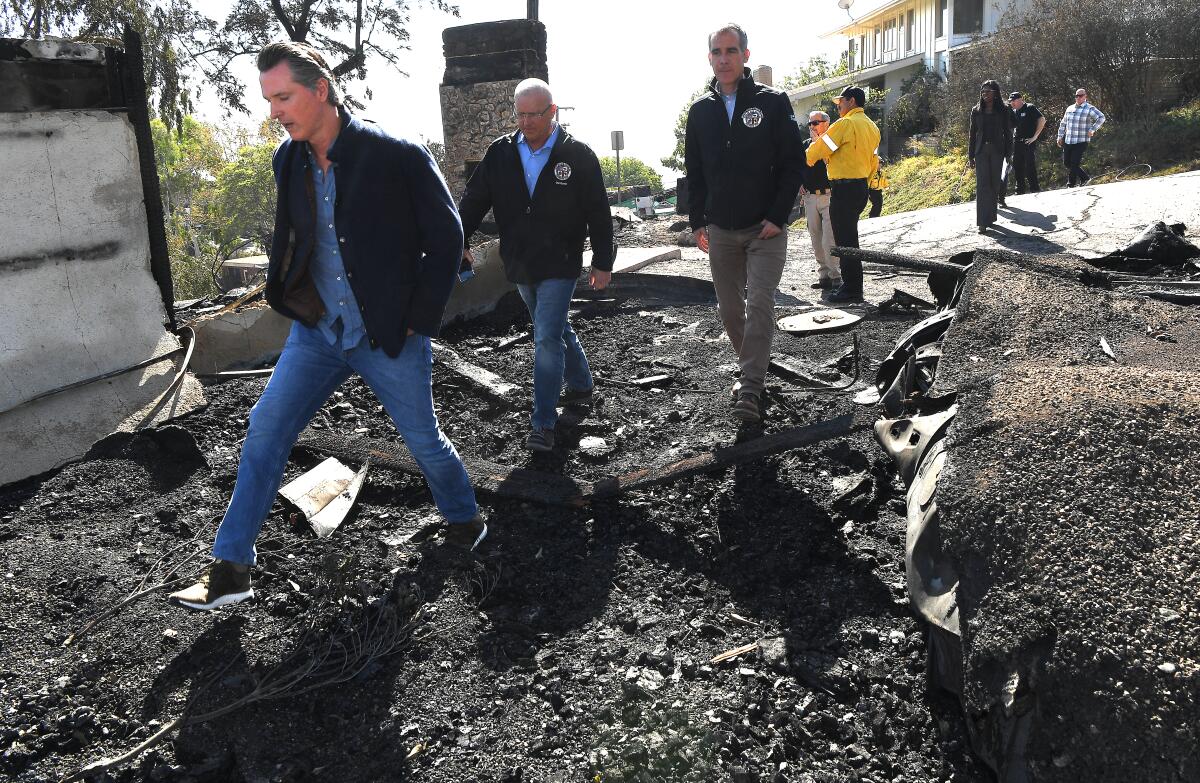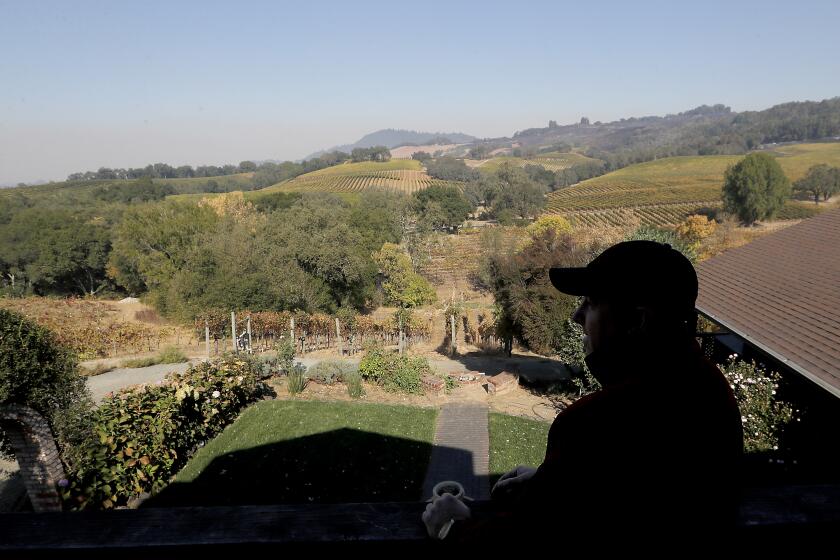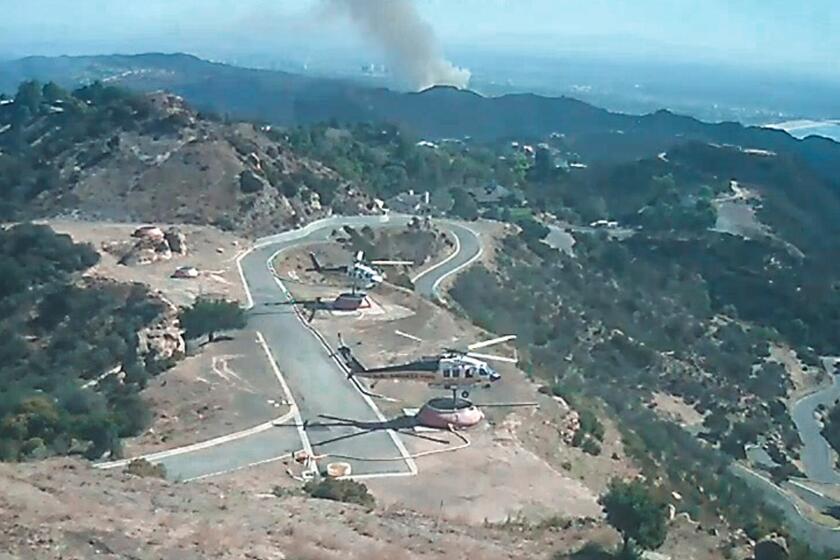As wildfires burn across California, President Trump lashes out at the state on Twitter

Autumn in California now comes not only with fierce, wind-driven wildfires but with routine claims from President Trump that the state’s leaders are to blame for the disasters, followed by assurances from experts that the president doesn’t know what he’s talking about.
The cycle renewed again Sunday, when Trump tweeted that Gov. Gavin Newsom and U.S. Rep. Adam Schiff (D-Burbank) had failed to properly manage the state’s forests, causing a string of recent blazes.
Newsom “has done a terrible job of forest management. I told him from the first day we met that he must ‘clean’ his forest floors regardless of what his bosses, the environmentalists, DEMAND of him. Must also do burns and cut fire stoppers,” Trump said in an early-morning missive on Twitter.
A few hours later he concluded a slam on Democrats for their impeachment inquiry against him, concluding, “Corrupt Adam should clean up & manage the California forests which are always burning!”
The president tossed in a shot at the state for its “ridiculously closed” water distribution policies.
The missives drew a combination of incredulity and anger from many Californians, in part because the vast majority of the acres consumed by fire since early October were grasslands and chaparral, far from the forest.
Residents also remarked on the president’s failure to express sympathy for the thousands of people displaced from their homes in recent weeks.
The online fracas did little to illuminate the realities of forest or water policy in California.
Of the 33 million acres of forest in the state, 57% is controlled by the federal government and even the timber industry — which Trump appears to be trying to support — has slammed the U.S. for doing too little to manage those vast holdings.
California’s leaders have acknowledged the need to reduce the fuel buildup in the forest the state does control. Gov. Jerry Brown signed a series of bills last year to streamline regulations for thinning forests in fire zones, allow limited removal of some larger trees and force cities and counties to plan better defenses for homes and communities. And Newsom has continued fire threat-reduction initiatives since he took office in January.
“You don’t believe in climate change. You are excused from this conversation,” Newsom responded to Trump via Twitter. The governor later issued a statement: “We’re successfully waging war against thousands of fires started across the state in the last few weeks due to extreme weather created by climate change while Trump is conducting a full on assault against the antidotes.”
The state government’s expanded commitment to wildfire prevention under Brown included a $1-billion pledge over five years to clean up thousands of acres of deadwood, scrub brush and forest — California’s biggest-ever program to reduce fire fuels.
The things that set California apart, for better or worse, were all there last Sunday afternoon: terrifying flames, wine country glamour and a rescue straight out of Hollywood.
That $200 million-a-year annual commitment and other spending are helping the state by “reducing fuels in the forest, increasing forest health, and defensible space around homes,” Newsom’s office said.
Countering Trump’s contention that the governor is in the thrall of environmentalists, his office said he had waived environmental regulations to fast-track work on 35 critical fire breaks to protect 200 of the state’s most vulnerable communities.
Newsom’s office contrasted California’s stepped-up efforts with what it said was the federal government’s slashing of spending on the same kind of work.
The U.S. Forest Service has reduced the forest it plans to “treat” through thinning, controlled burns and other measures to 220,000 acres, from the previously promised 310,000 acres, Newsom’s office said.
And California said Trump’s 2020 budget cut $40 million from hazardous fuels reduction.
But that discussion is all about forest land, while the fires that have bedeviled California for several weeks have mostly ignited far away from the tall timber.
The most destructive of the wildfires broke out in brushland near the 405 Freeway on L.A.’s suburban Westside, not far from the Getty Center museum. It was similar terrain that sparked the Easy fire, which threatened the Ronald Reagan Presidential Library in Simi Valley.
The Hillside fire began in national forest land in the San Bernardino National Forest, before quickly burning downhill into a San Bernardino neighborhood.
Although the massive Kincade fire in Sonoma County burned some forest, it also shifted into grass and scrub country alongside vineyards.
“These fires are not burning in forested landscapes where you could go in and do anything to alter the forest,” said Glen MacDonald, a geography professor at UCLA and expert on climate change and wildfire. “These are scrublands and grasslands and a discussion of forest management is completely not applicable.”
A wealthy former executive and L.A. County have transformed this picturesque property in the Santa Monica Mountains into a remote base for helicopters to refill their water tanks — a spot that’s helping prevent small fires from turning catastrophic.
Trump’s statements also fail to acknowledge the amount of work California has done to correct a legacy of fire containment that has left some forests overgrown and loaded with fuel, said Jay Ziegler, director of policy for the Nature Conservancy in California.
“California’s pace and scale of action in addressing this issue at the end of the Brown administration and now under Gov. Newsom is really unprecedented,” Ziegler said.
Trump’s slam was the latest in a series of attacks on California, coming after his attempt to reverse the state’s stringent fuel efficiency requirements for cars and trucks and his blaming of government for the exploding homeless population.
The White House issued no official statement on wildfires, but it appeared the president may have been responding to an interview in which Newsom accused Trump of “a full-on assault” on the state’s attempts to rein in Earth-warming greenhouses gases.
Trump concluded his string of three tweets on California’s wildfires with his attack on the state’s water regulations.
“Also, open up the ridiculously closed water lanes coming down from the North,” he wrote. “Don’t pour it out into the Pacific Ocean. Should be done immediately. California desperately needs water, and you can have it now!”
That embraces the position of some of the state’s farmers — that too much water is being allowed to flow into the San Joaquin and Sacramento River delta to support salmon, other fish and endangered species.
But it belies the fact that greater snowpack in 2017 and 2019 allowed bigger water allotments to Central Valley farmers, Ziegler said.
“It’s really misleading to tell farmers they could do better and get more water in future years,” Ziegler said, “when we are right at historic export levels because of the big winters we had in 2017 and 2019.”
Trump’s latest broadside comes just short of one year since he attacked California for “gross mismanagement of the forests.”
As with his most recent tweet, he then threatened to withdraw funding from the state, saying “Remedy now, or no more Fed payments!”
Among those chastising the president then was the president of the California Professional Firefighters. Brian Rice called Trump’s message and threat to withhold aid “ill-informed, ill-timed and demeaning to those who are suffering as well as the men and women on the front lines.”
A couple of months before that, Trump had used Twitter to claim that wildfires were “being magnified & made so much worse by the bad environmental laws which aren’t allowing massive amount of readily available water to be properly utilized.”
Again, experts closest to the scene corrected him. “We have plenty of water,” said Scott McLean, a spokesman for the California Department of Forestry and Fire Protection. “We are not having any issues with a lack of retardant or water.”
In his latest message Sunday, Trump said that the yearly pattern of fire in California was routinely followed by the state “coming to the Federal Government for $$$ help.” He added: “No more.”
That pronouncement particularly infuriated those who had read just three months ago how Trump had told Russian President Vladimir Putin that the U.S. stood ready to send aid to fight massive wildfires in Siberia.
Tweeted one disgruntled American on Sunday: “You forgot to send your thoughts and prayers to those affected by the fires....but of course we in California didn’t help get you elected so you don’t give a damn about us.”
More to Read
Sign up for Essential California
The most important California stories and recommendations in your inbox every morning.
You may occasionally receive promotional content from the Los Angeles Times.













